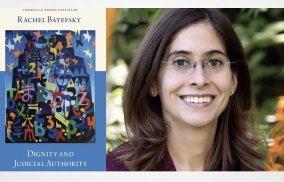A new book from University of Virginia School of Law professor Rachel Bayefsky explores a subject that is central to the human experience but, when applied to the law, can raise challenging questions: dignity.
Bayefsky first became interested in the concept of dignity while pursuing a D.Phil. in political theory at the University of Oxford prior to attending law school.
“Dignity and Judicial Authority,” which was published by Oxford University Press as part of the series “Theoretical Perspectives in Law,” makes the case for why discussions of dignity belong not just in philosophical debates but also in legal proceedings.
Dignity is “an important moral force in people’s personal lives and in social movements. Formal legal recognition allows key societal institutions to better reflect this reality,” Bayefsky said.
Bayefsky, whose research focuses on constitutional law, federal courts, civil procedure and legal theory, concentrates on the questions of how the law does and should protect dignity, and what role judges ought to play in promoting it.
“Dignity interests me because it is widely thought to be very significant, without agreement on why that is true or even on what it is,” she said. “It can be understood in many different ways. But complexity doesn’t mean the concept is incoherent.”
In her view, dignity includes three features: respect for status, the absence of domination and control over one’s self-presentation to others. She calls this account “relational dignity.” Bayefsky’s framework differs from a common definition of dignity as the inherent worth that each person possesses simply by being human.
To Bayefsky, relational dignity is preferable because it is tied to the concrete realization of dignity in actual social circumstances.
Bayefsky applies her definition to various specific areas of law. One is constitutional standing doctrine, which treats “injury in fact” as a prerequisite for entry to federal court. It can seem clear that damage has been done when someone is hurt in a physical or financial way. But when an individual’s dignity is harmed, courts may have trouble evaluating the damage. Bayefsky argues that dignitary harms — such as those arising from privacy violations or from government action excluding members of religious or racial groups — should nevertheless qualify as injury in fact.
Bayefsky also delves into the topic of “dignitary torts” — for example, battery that is committed through an offensive touch rather than physical harm. Here, judges may face the challenge of “where to draw the line,” she said; they may fear that acknowledging claims of dignitary violation will lead to unlimited liability.
More generally, judges may not want to wade into controversial disputes about whose dignity has been harmed. For instance, in debates over affirmative action, abortion and religious liberty, parties on multiple sides claim the mantle of dignity. So, identifying and rectifying dignitary violations poses challenges for judicial legitimacy and raises fundamental issues about the proper judicial role.
Regardless of the difficulties surrounding the definition and recognition of dignity, Bayefsky maintains that judges will not be able to avoid such problems by ignoring them.
“Judges are going to take actions that have an impact on people’s dignity, even if they prefer otherwise. The question is whether they can do that in a structured and productive way,” she said.
In the book, Bayefsky additionally considers remedies for the aggrieved.
“It seems straightforward for courts to issue remedies that do something physically to change your circumstances or that cause money to change hands. But what if courts issue relief that has an effect primarily by making a statement? Or what if courts mandate an apology? That could be a dignitary remedy, because it could change your social status,” Bayefsky said.
For some, a court-mandated apology would be ineffective because it would not be sincere. The book argues, however, that even an insincere apology is a social act that can vindicate a victim’s dignity independent of the contents of the perpetrator’s heart.
Bayefsky accepts that judicial recognition of dignity can be limited, including by factors like efficiency. But, she says, dignitary remedies should be part of a judge’s toolkit. Furthermore, taking dignity into account “deepens our understanding of what courts can do.”
“I hope this book can foster further conversation about the role that dignity plays in judicial systems and about how judges can more effectively integrate dignity into their rulings,” she said. “I also hope my work can contribute to the conceptual debate about what dignity actually means.”
Source
https://www.law.virginia.edu/news/202410/professors-book-argues-greater-judicial-recognition-dignity





